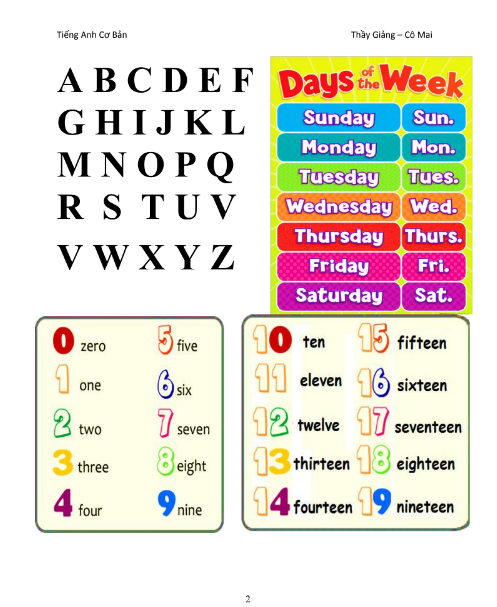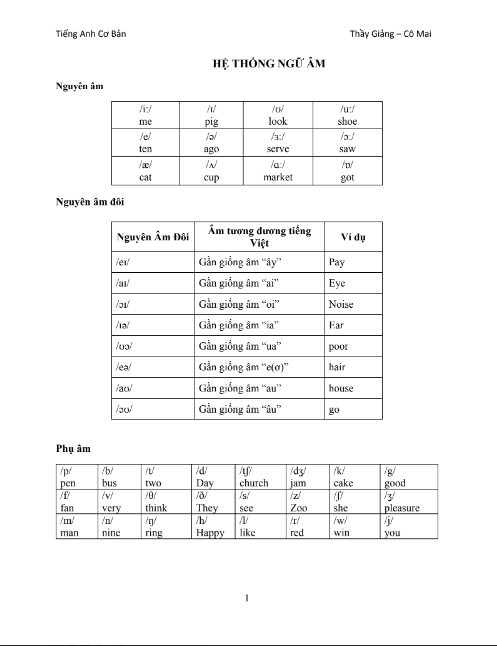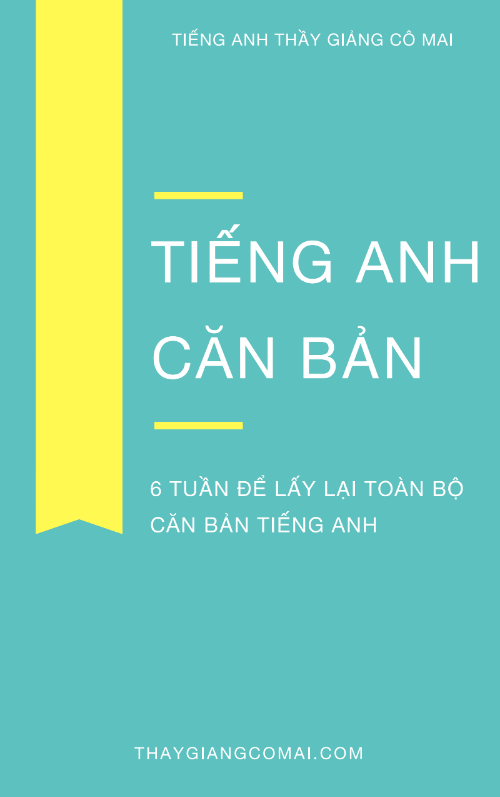Bên dưới đây mình có spoil trước 1 phần nội dung của cuốn sách với mục tiêu là để bạn tham khảo và tìm hiểu trước về nội dung của cuốn sách. Để xem được toàn bộ nội dung của cuốn sách này thì bạn hãy nhấn vào nút “Tải sách PDF ngay” ở bên trên để tải được cuốn sách bản full có tiếng Việt hoàn toàn MIỄN PHÍ nhé!



**Tiếng Anh Cơ Bản** **Thầy Giảng – Cô Mai** **HỆ THỐNG NGỮ ÂM** **Nguyên âm** | IPA | Tiếng Việt | Ví dụ | | :—- | :——————————————– | :———- | | /i/ | | me, pig, look, shoe | | /e/ | | ten, ago, serve, saw | | /æ/ | | cat, cup, market, got | **Nguyên âm đôi** | Nguyên Âm Đôi | Âm tương đương tiếng Việt | Ví dụ | | :———— | :———————— | :—- | | /ei/ | Gần giống âm “ây” | Pay | | /ai/ | Gần giống âm “ai” | Eye | | /oi/ | Gần giống âm “oi” | Noise | | /ia/ | Gần giống âm “ia” | Ear | | /ua/ | Gần giống âm “ua” | poor | | /eə/ | Gần giống âm “e(o)” | hair | | /aʊ/ | Gần giống âm “au” | house | | /əʊ/ | Gần giống âm “âu” | go | **Phụ âm** | IPA | Ví dụ | IPA | Ví dụ | IPA | Ví dụ | IPA | Ví dụ | | :— | :——– | :— | :——– | :— | :——– | :— | :——— | | /p/ | pen | /b/ | bus | /t/ | two | /d/ | Day | | /ð/ | church | /dʒ/ | jam | /k/ | cake | /g/ | good | | /f/ | fan | /v/ | very | /θ/ | think | /s/ | See | | /z/ | Zoo | /ʃ/ | she | /ʒ/ | pleasure | | | | /m/ | man | /n/ | nine | /ŋ/ | ring | /h/ | Happy | | /l/ | like | /r/ | red | /w/ | win | /j/ | you | — **Image 2** A B C D E F G H I J K L M N O P Q R S T U V V W X Y Z **Days of the Week** Sunday Sun. Monday Mon. Tuesday Tues. Wednesday Wed. Thursday Thurs. Friday Fri. Saturday Sat. 0 zero 1 one 2 two 3 three 4 four 5 five 6 six 7 seven 8 eight 9 nine 10 ten 11 eleven 12 twelve 13 thirteen 14 fourteen 15 fifteen 16 sixteen 17 seventeen 18 eighteen 19 nineteen —
20 Twenty 30 Thirty 40 Forty 50 Fifty 60 Sixty 70 Seventy 80 Eighty 90 Ninety 100 One hundred 1000 One thousand Một triệu One million Một tỷ One billion first second third fourth fifth **Months of the Year** January February March April May June July August September October November December — **Image 4** **Unit 1: THE PRESENT SIMPLE TENSE (Thi hiện tại đơn)** **I. Theory (lý thuyết)** **1. Pronouns (Đại từ)** | | Số ít | | Số nhiều | | :———- | :—————————————- | :———— | :—————————————– | | Ngôi thứ I | I (tôi) | | We (chúng tôi) | | Ngôi thứ II | You (bạn) | | You (các bạn) | | Ngôi thứ III| He (anh ấy), She (cô ấy), It (nó), Mary | | They (họ) | **2. The present simple tense (Thi hiện tại đơn)** **a. Structure (Cấu trúc):** Xét theo loại động từ. Trong tiếng Anh có 2 loại động từ: động từ Tobe và động từ thường. * **Động từ tobe** * Trong thì hiện tại đơn, động từ Tobe có 3 thế : am, is, are (thì, là, ở). * Cấu khẳng định: I + am = I’m You, We, They + are = you’re He, She, It, Mary + is = he’s * Ex: She is beautiful. (Cô ấy thì đẹp) I am a teacher. (Tôi là MỘT giáo viên) They are teachers. (Họ là NHỮNG giáo viên) They are at home. (Họ ở nhà) * Cấu phủ định: ta thêm “not” vào sau động từ tobe. I + am + not = I’m not You, We, They + are + not = aren’t He, She, It, Mary + is + not = isn’t * Ex: She is not beautiful. (Cô ấy thì không đẹp) I am not a teacher. (Tôi không là một giáo viên) They are not at home. (Họ không ở nhà) * Câu nghi vấn: ta đưa tobe lên trước chủ từ (dịch là có…hay không). Am I? Is he, she, it, Mary? Are we, you, They? Is she beautiful? (Cô ấy có đẹp không?) Are you a teacher? (Bạn có là giáo viên không?) Are they at home? (Họ có ở nhà không?) * Cách trả lời: Yes, I am. No, I’m not. Yes, he is. No, he isn’t. Yes, we are. No, we aren’t. Yes, she is. Hoặc No, she isn’t. Yes, I am. Hoặc No, I aren’t. Yes, they are. No, they aren’t.
* **Động từ thường** * Là số nhiều động từ còn lại như run (chạy), play (chơi), study (học), swim (bơi),… * Cấu khẳng định: I, You, We, They + nguyên mẫu He, She, It, Mary + V -s/-es *Nếu chủ ngữ ngôi số ít => động từ chính thêm s hoặc es* * Ex: I swim. (Tôi bơi.) He swims. (Anh ấy bơi.) They go to school. (Họ đi đến trường.) She goes to school. (Cô ấy đi đến trường.) * Cấu phủ định: ta thêm “not” sau trợ động từ to/does I, You, We, They + do not + V nguyên mẫu He, She, It, Mary + does not + V nguyên mẫu *Khi trong câu có trợ động từ, động từ chính trở về nguyên mẫu.* * Ex: I don’t swim. (Tôi không bơi.) He doesn’t swim. (Anh ấy không bơi.) They don’t go to school. (Họ không đi đến trường.) She doesn’t go to school. (Cô ấy không đi đến trường.) * Câu nghi vấn: ta mượn trợ động từ to/does và đưa ra trước chủ từ (dịch là có… hay không). Do + I, you, we, they + V nguyên mẫu? Does + he, she, it, Mary + V nguyên mẫu? Cách trả lời: Yes, I do. No, I don’t. Yes, he does. No, he doesn’t. * Ex: Do you swim? (Bạn có bơi không?) Yes, I do. / No, I don’t. Do you homework? (Các bạn có làm bài tập về nhà không?) Yes, we do. / No, we don’t. Does he swim? (Anh ấy có bơi không?) Yes, he does. / No, he doesn’t. Do they go to school? (Họ có đi đến trường không?) Yes, they do. / No, they don’t. Does she go to school? (Cô ấy có đi đến trường không?) Yes, she does. / No, she doesn’t. * **b. Usage (cách dùng):** * Một thói quen, một sự thật hiển nhiên. * Một thói quen, một hành động xảy ra thường xuyên ở hiện tại. * **c. Các trạng từ đi kèm với thì hiện tại đơn:** – Never (không bao giờ), sometimes (thỉnh thoảng), often (thường), usually (thường), always (luôn luôn)… – every morning (mỗi sáng), every afternoon (mỗi chiều), every evening (mỗi tối), every day (mỗi ngày), every week (mỗi tuần), every month (mỗi tháng)… —
**II. Exercises (Bài tập)** **Bài tập 1:** Sử dụng đúng động từ tobe trong những câu bên dưới, sau đó chuyển thành câu phủ định và nghi vấn. 1. He \_\_\_\_\_\_ is a lawyer. He \_\_\_\_\_\_ is not a lawyer. Is he \_\_\_\_\_\_ a lawyer? 2. They \_\_\_\_\_\_ teachers. 3. John \_\_\_\_\_\_ in the room. 4. James \_\_\_\_\_\_ handsome. 5. It \_\_\_\_\_\_ on the table. 6. We \_\_\_\_\_\_ in the restaurant. 7. They \_\_\_\_\_\_ in the workplace. 8. Jane \_\_\_\_\_\_ at the bank. 9. You \_\_\_\_\_\_ at the party. 10. We \_\_\_\_\_\_ in the house. 11. I \_\_\_\_\_\_ tired. 12. He \_\_\_\_\_\_ strong. 13. She \_\_\_\_\_\_ in the factory. 14. It \_\_\_\_\_\_ big. 15. They \_\_\_\_\_\_ students. 16. It \_\_\_\_\_\_ summer. 17. They \_\_\_\_\_\_ doctors. 18. It \_\_\_\_\_\_ small. 19. I \_\_\_\_\_\_ a secretary in the company. 20. Alan \_\_\_\_\_\_ a teacher. **Bài tập 2:** Chia động từ trong ngoặc với thì hiện tại đơn, sau đó viết câu phủ định và nghi vấn. 1. She (go) \_\_\_\_\_\_ to school in the morning. She doesn’t go to school in the morning. Does she go to school in the morning? 2. (go) 3. (do) 4. (be) 5. (have) 6. (play) 7. (work) 8. (live) 9. (study) 10. (eat) 11. (like) 12. (watch) 13. (read) 14. (make) 15. (want) 16. (need) 17. (know) 18. (take) 19. (see) 20. (give) — **III. Bài đọc (Dịch những câu sau sang tiếng Việt và trả lời câu hỏi)** Jane is a student. In the summer, she doesn’t go to school. She is at home. In the morning, she does the housework. Then, she reads a book and listens to music. In the afternoon, she usually plays soccer with other students. They shout and laugh. They are happy. They eat and drink. Then she goes home. In the evening, she watches TV. She doesn’t do homework. At ten, she sleeps. She loves summer! a) Is Jane a doctor? b) Does she go to school in the summer? c) Does she do homework in the morning? d) Are they happy in the afternoon? e) Does she love summer? James is a doctor. He works in the hospital. He starts a day in the morning and finishes the day in the evening. In the hospital, he meets some nurses. They are tall and thin but they are not weak. They are strong. They are young and beautiful. James is short and fat but he is handsome. The director is old. He is always happy. He usually stands at the door and looks at James. In the afternoon, they are hungry. They go to a restaurant. They meet a guard and he opens the door. In the restaurant, they eat and drink. James is not sad. He is happy. a) Is James a doctor? b) Does he work at the bank? c) Are the nurses tall? d) Are they old? e) Is James thin? f) Is the director sad? g) Does he usually look at James? I am Henry. I live in the house. I am the manager in the company. Every day, I meet the secretary in the workplace. I know a worker in the factory. He is strong and handsome. I know some businessmen and businesswomen at the party. Every evening, I study English at school. In the classroom, the teacher speaks English and writes on the board. On the shelf, there are some books. I like the class. a) Is Henry a manager? b) Does he meet the secretary at the restaurant? c) Does the worker work at the party? d) Is he at school in the evening? e) Are the books on the table? — **IV. Vocabulary (Từ vựng)** **Noun (danh từ)** | Season (Mùa) | spring/sprinɡ/ mùa xuân | summer /sʌmə(r)/ mùa hè | fall/fɔːl/ mùa thu | winter /wɪntə(r)/ mùa đông | | :———- | :———————- | :———————– | :————— | :————————— | | Job/Nghề nghiệp | teacher /tiːtʃə(r)/ giáo viên | student /stjuːdənt/ sinh viên | engineer /endʒɪˈnɪə(r)/, /ɛndʒɪˈnɪə(r)/ | doctor /’dɒktə(r)/ bác sĩ | | | nurse /nɜːs/ y tá | dentist /’dentɪst/ nha sĩ | singer /’sɪŋə(r)/ ca sĩ | manager (quản lí) /’mænɪdʒə(r)/ | | | director (giám đốc)/’daɪrektə(r)/ | businessman /’bɪznəsmæn/ nam doanh nhân | businesswoman /’bɪznəswʊmən/ nữ doanh nhân | salesperson /’seɪlzpɜːsn/ người bán hàng | | | secretary /’sekrətri/ thư kí | worker /’wɜːkə(r)/ công nhân | driver /’draɪvə(r)/ tài xế | guard /ɡɑːd/ bảo vệ | | | receptionist (lễ tân)/ri’sepʃənɪst/ | lawyer /’lɔːjə(r)/ luật sư | police officer /pə’liːs ‘ɒfɪsə(r)/ cảnh sát | farmer /’fɑːmə(r)/ nông dân |
**Bài tập 1: Sử dụng đúng động từ tobe trong những câu bên dưới, sau đó chuyển thành câu phủ định và nghi vấn.** 2. They **are** teachers. They **aren’t** teachers. **Are** they teachers? 3. John **isn’t** in the room. **Is** John in the room? 4. **is** James **isn’t** handsome. **Is** James handsome? 5. **is** It **isn’t** on the table. **Is** it on the table? 6. **are** We **aren’t** in the restaurant. **Are** you in the restaurant? 7. **are** They **aren’t** in the workplace. **Are** they in the workplace? 8. **is** Jane **isn’t** at the bank. **Is** Jane at the bank? 9. **are** You **aren’t** at the party. **Are** you at the party? 10. **are** We **aren’t** in the house. **Are** we in the house? 11. **am** I’m **not** tired. **Are** you tired? 12. **is** He **isn’t** strong. **Is** he strong? 13. **is** She **isn’t** in the factory. **Is** she in the factory? 14. **is** It **isn’t** big. **Is** it big? 15. **are** They **aren’t** students. **Are** they students? 16. **is** It **isn’t** summer. **Is** it summer? 17. **are** They **aren’t** doctor. **Are** they doctor? 18. **is** It **isn’t** small. **Is** it small? 19. **am** I’m **not** a secretary in the company. **Are** you a secretary in the company? 20. **is** Alan **isn’t** teacher. **Is** Alan a teacher? — **Bài tập 2: Chia động từ trong ngoặc với thì hiện tại đơn, sau đó viết câu phủ định và nghi vấn.** 2. **do** Every morning, I **do** homework. Every morning, I don’t do homework. Every morning, do you do homework? 3. **listens** In the evening, Ann **listens** to music. In the evening, Ann doesn’t listen to music. In the evening, does Ann listen to music? 4. **close** I **close** the book. I don’t close the book. Do you close the book? 5. **plays** Every morning, he **plays** soccer. Every morning, he doesn’t play soccer. Every morning, does he play soccer? 6. **watch** Every evening, we **watch** TV. Every evening, we don’t watch TV. Every evening, do we watch TV? 7. **go** The children **go** to school. The children don’t go to school. Do the children go to school? 8. **read** You **read** book. You don’t read book. Do you read book? 9. **live** They **live** in the hotel. They don’t live in the hotel. Do they live in the hotel? 10. **paints** Every month, he **paints** on the wall. Every month, he doesn’t paint on the wall. Every month, does he paint on the wall?


